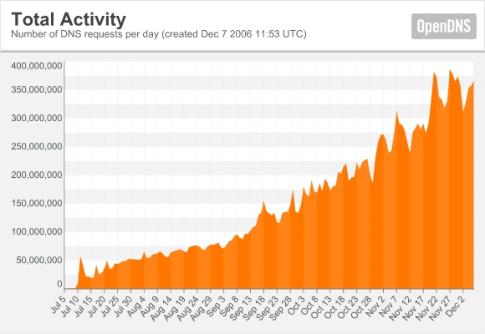DNS for the Web 2.0 age

The current coverage for Swivel is a boost for Minor Ventures, the investment fund set up by CNET founder Halsey Minor. I've recently become a fan of another Minor-backed startup, OpenDNS.
A few weeks ago, I was on the verge of buying a new broadband router. I had been getting inexplicable delays and outages when attempting to access familiar websites. I was convinced it was an intermittent DNS problem on my Internet connection, but of course my ISP insisted there was no problem at their end. They weren't going to investigate any further unless I could prove the problem wasn't due to my own equipment. Then, in the nick of time, someone told me about OpenDNS.
The service is elegant in its simplicity (and is growing virally — see usage chart below). It's a free-of-charge service (funded by advertising — more on that in a moment) that specializes in providing robust DNS lookups. At many ISPs, the domain name look-up servers (DNS) are the neglected poor relations of the infrastructure. Yet they're a vital component in rapid surfing speeds between sites, because every time you click on a link from one site to another, the first thing that happens is your computer has to look up the IP address on the nearest DNS server. If that server is poorly maintained or overloaded, you'll sit waiting for the site to come up.

Switching to OpenDNS is simply a matter of going to your router admin page and inserting its IP addresses as your preferred DNS lookup. I found an instant improvement in lookup speeds and, better still, no unexplained outages since then. If a site does happen to be down, then instead of not knowing what's going on, I get redirected to an OpenDNS search page — and that's how the company makes its money, from the ads on the search page when a domain won't resolve. (It also offers other useful services, like barring known phishing sites and correcting common mistypes, such as skipping the 'o' when typing '.cm'.
The reason OpenDNS is faster — even though I'm in London and its nearest servers are currently in New York (a London server is promised soon) — is that the company has invested in a fast machine with a decent-sized cache, so the server does the DNS lookup without having to pass the request out to other servers in the network.
This kind of service is even more important in the Web 2.0 age because in the era of DHTML and AJAX we're viewing composite web pages that contain information and objects sourced from multiple different servers and domains. Fast DNS lookups become a major contribution to rapid page loading, and the more bandwidth you have, the more of a relative performance hit you'll take from poor DNS infrastructure.
I'm not surprised Minor has backed this company. It addresses a need that's going to become huge as the trend accelerates towards composite Web pages and desktop widgets. Although it's a few years since we were last in touch, he and I have always seen eye to eye about trends in online computing, and I was an advisor to Grand Central, an earlier venture that acted as a hub for web services integration, and to which Swivel is in some senses a successor. I'm intrigued by Swivel, in part because it conforms to my contention that what matters in Web 2.0 isn't ownership of the data, but what you do with the views.